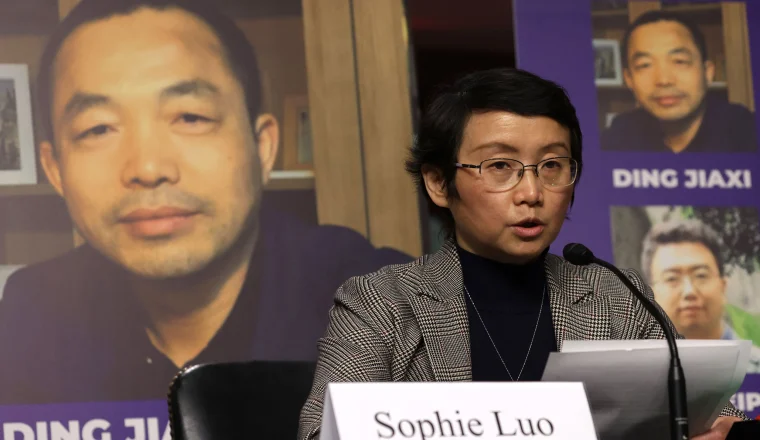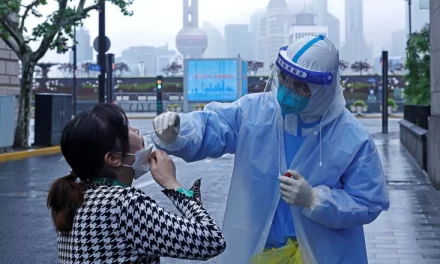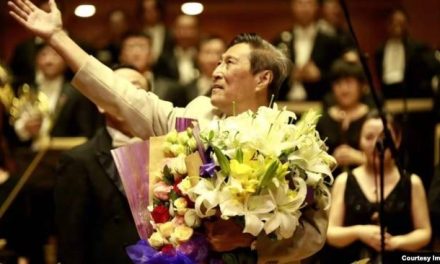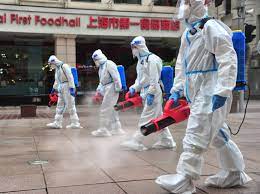By JIANLI YANG
This year, the Chinese New Year fell on February 1. Three days later, on February 4, the 2022 Beijing Winter Olympics began and Beijing became the only city thus far to host both the Summer and the Winter Olympic Games. According to Chinese tradition, we celebrate our Spring Festival for 15 days, starting on our New Year’s Day. So the Beijing Winter Olympics should be adding another layer of excitement on top of the traditional Chinese jubilee. Now should be a doubly joyful and proud moment for the Chinese people. But it is not.
The Spring Festival is the most important time of year for Chinese to gather with families, just as Thanksgiving and Christmas are for most Americans. During this time, most Chinese return to their hometowns to celebrate an entire year’s hard work and achievements, in reunions with grandparents, parents, siblings, cousins, old friends, and neighbors. For those Chinese like me, who for many years have been kept in prison or forced to live in exile, it is actually the most painful moment, when we are reminded that home is so very far away that returning there is unthinkable.
A well-known poem from Chinese Tang Dynasty reads, “I miss my family all the more each festival day.” For those like me who cannot go home for the Spring Festival, we give remote greetings if we can to our families and hometown friends. But two hometown compatriots of mine, whom I am worried about and earnestly praying for, may not be able to receive my greetings. It is not because of the Chinese government’s censorship, ubiquitous in the country, but because they are being detained as political prisoners.
They are Mr. Ding Jiaxi and Mr. Xu Zhiyong, two important leaders of the Chinese Citizens Movement, which they helped found in 2011. They are not my hometown friends in the sense that we are from the same city or even province — Ding Jiaxi is from Hubei, and Xi Zhyong from Henan, while I am from Shandong. I take them to be my dear hometown compatriots because they have been detained in my hometown, Linyi, Shandong, and will be tried there and almost surely sentenced to long prison terms for the “crime” of subverting state power. More importantly, they are my fellow freedom fighters and fellow prisoners of conscience. (I was detained in Beijing for five years, from 2002 to 2007.)
Ding Jiaxi and Xu Zhiyong are both human-rights lawyers. The Chinese Citizens Movement they lead is centered on empowering the Chinese people to defend and exercise their rights as citizens under the Chinese constitution, just as the democracy leader Václav Havel called on his countrymen to do in fighting Czechoslovakia’s communist regime in the 1970s and ’80s: by living in truth and then striving to be citizens in a post-totalitarian society. These two Chinese citizens called for the disclosure of the financial assets of government officials and advocated for equal access to public education for all, especially for the children of migrant workers. Their peaceful activities landed them in prison in 2012 and 2013, sentenced to terms of three and a half and four years, respectively.
After they were released, they recommitted themselves to advancing civil rights for the citizens of China. By that time, Xi Jinping, already ensconced in power, had consolidated and tightened his control over Chinese society to a degree unseen for decades. Despite the riskier and more coercive political climate, Ding Jiaxi and Xu Zhiyong continued to promote the development of civil society, reaching out to citizens around the country who shared their aspirations. The intensified activism of the two lawyers put them in the crosshairs of the Chinese government, unsurprisingly. They attended a two-day private gathering with around 20 lawyers and friends in Xiamen city in Fujian Province on December 7 and 8, 2019. Chinese police detained Ding Jiaxi on December 26, 2019, and Xu Zhiyong on February 15, 2020, and held them under a police measure called “residential surveillance at a designated location” (RSDL). While held in RSDL, according to the report by Ding Jiaxi’s wife, Luo Shengchun, both were subjected to torture and other mistreatment, including but not limited to prolonged sleep deprivation, harassment through loud noises, interrogation while strapped tightly to an iron “tiger chair,” food and water restrictions, and deprivation of showers and exposure to sunlight.
In June 2020, Ding Jiaxi and Xu Zhiyong were transferred to the Linshu Detention Center in Linyi, where they continued to suffer physical and mental abuse. They were not allowed to see their lawyers until January 2021. After they did, their lawyers were forced to sign confidentiality agreements that forbade them from copying case files, discussing case details, doing interviews with the media, or speaking publicly about their cases. In August 2021 the two were both formally indicted on the “crime” of subversion of state power.
At a time when the Chinese people are supposed to gather with family and friends, these two good men — two sons, husbands, fathers, and friends to many — are languishing in prison, deprived of any communication with loved ones. While the Chinese Communist regime and its leader, Xi Jinping, are putting on a self-servingly grandiose nationalist show at the Winter Olympics, these two true patriots, who represent the best that Chinese citizens can be and should be, are suffering unspeakable tortures for their love for their country and their people.
This is as far from the Olympic spirit as it is possible to imagine. If there is such a spirit, which I take to be peace, love, fair play, and the full development of human ability, there is no doubt that Ding Jiaxi and Xu Zhiyong are its defenders while the Chinese Communist Party and the International Olympic Committee are its enemies. The CCP, enabled by the IOC, is engaging in sportswashing the blood that it has spilled and that stains the five rings.
In choosing Beijing to host the 2022 Winter Olympics, the IOC has chosen either to trust the Chinese government’s assurances regarding human rights — even though Beijing’s record before and after the 2008 Olympics showed contempt for the promises it had made — or not to care at all. Perhaps both.
As the world watched, the Chinese government committed gross human-rights abuses in the run-up to the 2008 Games. Just before the IOC’s final decision in 2015 to choose China for the 2022 Winter Olympics, IOC official Mark Adams said in a letter that Beijing had given the IOC new “assurances” concerning “human rights, the right to demonstrate, media freedom to report on the Games with no restrictions on the Internet, labor rights, displacement, and environmental protection.” He said that this time the IOC was “confident that the Government of China would take all necessary measures to ensure the Olympic Charter” and that its contract with the IOC “would be respected should they be elected.” The IOC has learned nothing, and this time the situation is much worse.
These Olympics are just another example of Chinese leaders always getting a new license to act with impunity. Enough is enough. As we watch these shameful “trials” unfold, let us not forget to hold my two new hometown compatriots in our hearts, and in those hearts to wish them a happy Chinese New Year.
This article first appeared in National Review on February 13, 2022
























